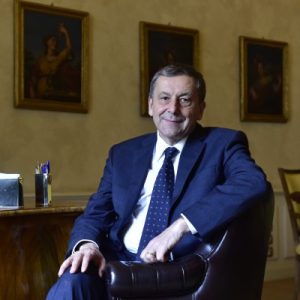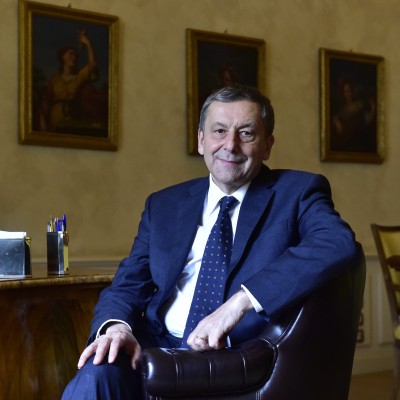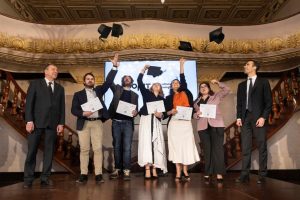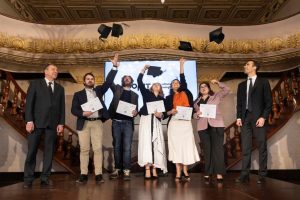

Written on April 11th 2024
Source here: Huffpost IT (full article in Italian)
Francesco Profumo: “Our universities are at the top thanks to a far-sighted policy”
Italy is the seventh in the world and second in Europe for university education. Interview with the professor and manager, now president of Uni-Italia: a success born from the reform of university autonomy; we realized early on that it was necessary to hybridize knowledge; we are attractive to the world; the south is also growing
Francesco Profumo, former Minister of Education, University and Research in the Monti government, was first dean of the Faculty of Engineering and then rector from 2005 to 2011 of the Polytechnic of Turin, the university from which he graduated in electrical engineering in 1977. He chaired the Compagnia di San Paolo and the Acri (Association of Foundations and Savings Banks) until March 2024 and is currently president of Uni-Italia and rector of the Open Institute of Technology.
Read full article here: Huffpost IT
Related posts

Source:
- La Stampa, published on March 11th, 2025
By Francesco Profumo
Education must therefore change its paradigm: from a system based on the accumulation of knowledge to a process that teaches how to think.
We live in an era in which access to information has become immediate and unlimited. All it takes is an internet search or a question to a virtual assistant to get answers on any topic. Yet, precisely in a world so saturated with data, a crucial challenge for education emerges: it is no longer enough to teach what to know, but it becomes essential to educate in critical thinking, in the ability to discern, connect and, above all, ask the right questions. After Trump’s election as President of the United States, this need to be able to discern between true and false has become even more important and starting to educate the new generations and re-educate the more mature ones along these lines can no longer be postponed over time.
Until a few decades ago, the value of education was linked to the acquisition of knowledge. Studying meant accumulating notions, mastering facts and concepts and then applying them. Today, however, the context has completely changed. Information is available everywhere, often in real time. The problem is no longer finding it, but understanding which is reliable, which has value and which is, instead, the result of distortions or manipulations. This transformation leads us to radically rethink the educational model: school can no longer be a simple place for transmitting knowledge, but must become an environment in which one learns to reason.
To achieve this, we can look at an ancient and ever-present approach: the Socratic method. Socrates did not give answers, but guided his interlocutors in the search for truth through continuous dialogue. With pressing questions, he pushed them to reflect on their beliefs, to question apparent certainties and to build a more solid and profound understanding of reality. This method, based on maieutics, did not simply transmit notions, but developed a mental attitude: the ability to question, to doubt, to explore with a critical spirit. Today, more than ever, we need to recover this attitude. In a world where technology presents us with a continuous flow of information and artificial intelligence promises to answer all our doubts, what really matters is how we formulate our questions. Knowing how to question reality becomes more important than the simple act of receiving an answer. The advent of artificial intelligence is accelerating the need for an education based on reflection and not on the mere acquisition of data. AI systems can generate texts, solve problems, propose analyses. But those who learn to use them without developing critical thinking risk becoming passive users, unable to distinguish between what is true and what is manipulated, between what is useful and what is irrelevant.
For this reason, the school of the future should transform itself into a laboratory of thought, where students are no longer evaluated only on the basis of the answers they provide, but on the quality of the questions they are able to ask. An education based on the Socratic method could be expressed through lessons focused on comparison, on the critical analysis of sources, on discussions that push students to defend or question different positions. Let’s imagine a classroom in which students do not limit themselves to studying notions, but are guided to explore a topic through open and challenging questions. Instead of explaining a phenomenon, the teacher could start a discussion, encouraging students to think about its causes, its implications, and its connections with other disciplines. Artificial intelligence could also become an active learning tool: not as a simple provider of answers, but as an interlocutor to interact with, to whom to submit increasingly sophisticated questions, experimenting with how the quality of interaction depends on the ability to formulate complex and well-structured questions.
Education must therefore change its paradigm: from a system based on the accumulation of knowledge to a process that teaches how to think. We must train students who are capable of navigating knowledge, not just storing it. In a future where work itself will be increasingly based on the ability to innovate, connect ideas and solve complex problems, these skills will be essential. The great educational challenge of the coming years will no longer be to teach notions, but to cultivate the ability to question the world. The question we must ask ourselves today is not only what we must teach our children, but how we can educate them to think critically and creatively. If we want the new generations to be truly ready to face the era of artificial intelligence, we must offer them something that no machine will ever be able to replace: the ability to ask questions that matter.

Source:
- Avvenire, published on March 20th, 2025
Diploma to the first 40 students of OPIT, Open Institute of Technology. Rector Profumo: “It is the first chapter of a path of continuous growth with new courses”
First graduates from OPIT (Open Institute of Technology), an exclusively online academic institution accredited at European level based in the Maltese capital Valletta. At the end of a study program that began in September 2023, 40 students from 6 continents have obtained a master’s degree in Applied Data Science & AI. The topics chosen for the theses are innovative: use of large language models for the creation of chatbots in the ed-tech field, digitalization of customer support processes in the paper and non-woven fabric industry, up to personal data protection systems and the use of Artificial Intelligence for environmental sustainability, predictive models for the prevention of disasters linked to climate change, fight against money laundering, new perspectives of generative AI in the legal field (with a focus on Italian startups such as Giurimatrix). The theses were also developed in collaboration with partner companies such as Neperia, Sintica, Cosmico, Dylog, Buffetti Finance and Hype.
“With these 40 graduates we celebrate the first chapter of a path that will continue to grow with a consolidation of the current educational offering, new courses, doctoral programs, applied research and increasingly advanced training opportunities”, underlines the rector of OPIT, Francesco Profumo.
OPIT currently offers six degree courses (a three-year degree in Modern Computer Science, a master’s degree in Applied Data Science & AI, a three-year degree in Digital Business and the master’s degrees in Enterprise Cybersecurity, Digital Business and Innovation and Responsible Artificial Intelligence), with a total catchment area of over 300 students from 78 countries and 6 continents, with an average age of 35. 80% of the enrolled population is represented by working students, destined to double based on projections on the number of students enrolled in degrees starting in 2025. This year, moreover, the research area will also develop, paving the way, in the coming years, for doctoral programs and aligning itself even more with what universities around the world already do.
“The success of this first class of graduates represents a significant milestone for OPIT and confirms our mission: to offer a high-level technological education, accessible globally and able to concretely respond to the needs of a constantly evolving job market”, recalls Riccardo Ocleppo, founder of OPIT.
Have questions?
Visit our FAQ page or get in touch with us!
Write us at +39 335 576 0263
Get in touch at hello@opit.com
Talk to one of our Study Advisors
We are international
We can speak in:


